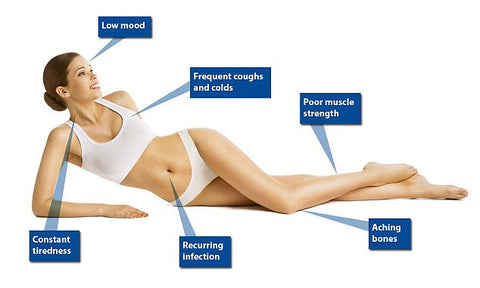Symptoms of Vitamin D deficiency
Vitamin D is a vital nutrient that has a wide range of effects on your body's overall health. Vitamin D, unlike other vitamins, acts as a hormone, and every cell in your body has a receptor for it. When your skin is exposed to sunshine, your body produces it from cholesterol.
It's also found in specific foods like fatty fish and fortified dairy products, though getting enough from diet alone is difficult.
The recommended daily intake (RDI) for vitamin D is normally approximately 400–800 IU, but many experts recommend getting considerably more.
Vitamin D insufficiency is a typical occurrence. Around 1 billion people globally are thought to have low amounts of the vitamin in their blood.
Vitamin D insufficiency is the major global health issue. According to research from 2011, 41.6 percent of adults in the United States are vitamin D deficient. Hispanics had a higher rate of 69.2 percent, while African-Americans had an even higher rate of 82.1 percent.
The majority of people are unaware that they are deficient because the symptoms are usually minor. Even if they're having a substantial negative impact on your quality of life, you might not notice them right away.

There are seven major signs and symptoms of vitamin D insufficiency that you should be aware of.
Frequently getting ill and infected
One of vitamin D's most crucial functions is to maintain your immune system’s health so you can fight with illness-causing viruses and bacteria.
It interacts directly with the cells that are in charge of battling the infection.
Low vitamin D levels may be a contributing cause if you become sick frequently, especially with colds or the flu.
A relationship between a deficit of vitamin D and respiratory tract illnesses such as colds, bronchitis, and pneumonia has been discovered in several large observational studies.
Taking vitamin D supplements at a dose of up to 4,000 IU per day has been shown in several studies to lessen the incidence of respiratory tract infections.
Fatigue and exhaustion
Tiredness can be caused by a variety of factors, including vitamin D insufficiency.
Vitamin D insufficiency is common, and it's been linked to fatigue and other vague symptoms like headaches, musculoskeletal discomfort and weakness, depression, and poor cognitive performance.
Because vitamin D is essential for bone health, a lack of it can induce bone and muscle weakness, as well as weariness.
Researchers showed that taking supplemental vitamin D for 5 weeks dramatically alleviated fatigue symptoms in 174 people with exhaustion, as per the research.
Back and bone pain
Vitamin D is beneficial to bone health in a variety of ways.
It helps your body absorb calcium, for starters.
Inadequate vitamin D levels in the blood can cause bone pain and lower back discomfort.
A link between vitamin D deficiency and chronic lower back pain has been discovered in large observational studies.
More than 9,000 older women were studied to see if there was a link between vitamin D levels and back discomfort.
The researchers discovered that people who had a deficiency were more likely to suffer from back pain, particularly severe back pain that hampered their everyday activities.
Depression
A depressed mood could also indicate a vitamin D deficiency.
Vitamin D insufficiency has been associated with depression particularly in older persons.
Giving vitamin D to those who are deficient helps relieve depression, especially seasonal depression that occurs during the winter months, according to several controlled research.
As a result, a person with very low vitamin D levels and depression may benefit from taking a vitamin D supplement, according to the researchers.
Wound healing issues
It could be a symptom of low vitamin D levels if wounds take longer to heal than usual.
According to one study, vitamin D plays a vital role in wound healing by regulating growth factors and other substances involved in the formation of new tissue.
The researchers discovered that those who took 50,000 international units (IU) of vitamin D per week for two months had better wound-healing.
Bone loss
Calcium absorption and bone metabolism are both aided by vitamin D.
Many seniors who have been diagnosed with bone loss believe they need to increase their calcium intake. They may, however, be lacking in vitamin D.
Low bone mineral density indicates that calcium and other minerals have been lost from your bones. Fractures are more likely to occur in older persons, particularly women.
Researchers discovered a robust relationship between low vitamin D levels and reduced bone mineral density in over 1,100 middle-aged women in menopause or postmenopause in a large observational study.
Regardless of these findings, keeping appropriate vitamin D levels in the blood and preventing fractures may be a beneficial strategy for maintaining bone mass and reducing fracture risk.
Muscle Pain
Muscle soreness is notoriously difficult to diagnose.
There is some evidence that vitamin D insufficiency in children and adults may be a cause of muscle discomfort.
A deficit in rates caused discomfort and sensitivity due to the stimulation of nociceptors in muscles, according to one study.
Taking high-dose vitamin D supplements has been shown in a few trials to alleviate various types of pain in those who are deficient.
….
Vitamin D insufficiency is extremely widespread, yet the majority of individuals are completely ignorant of it.
Because the symptoms are typically vague and non-specific, it's difficult to tell if they're caused by low vitamin D levels or something else.
If you suspect you have a deficiency, you should consult your doctor and get your blood levels checked.
A vitamin D shortage, however, is usually simple to correct.
You can either get more sun or consume more vitamin D-rich foods like fatty fish and fortified dairy products. You can also purchase vitamin D supplements for easy and fast recovery.
….


Leave a comment